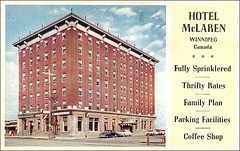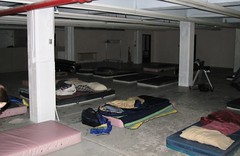Seen as scary and offensive to many, the Single Room Occupancy (SRO) hotel is disappearing from Winnipeg's downtown landscape.
Places like the Savoy, Brunswick and Leland were closed and torn down in the 1990s with the false hope that by ridding the area of the bricks and mortar, the 'undesirables' and related social problems would disappear with them.
Places like the Savoy, Brunswick and Leland were closed and torn down in the 1990s with the false hope that by ridding the area of the bricks and mortar, the 'undesirables' and related social problems would disappear with them.

In a 2005 study entitled "Beyond the Front Desk: A Residential Hotel as a Home", Winnipeg's Institute of Urban Studies found that there were still 1,000 people living in 772 hotel rooms in and around Main Street, (page 27).
There are a host of reasons why people choose SROs as a housing option.
Many of us would consider them desperate people on the bottom wrung of the housing ladder, perhaps trouble makers or suffering from mental health or addictions issues that preclude them from the regular housing market. Interestingly, though, the IUS' detailed interviews with residents found that many actually chose SRO living, citing the flexibility, freedom and sense of community that a high-rise or social housing doesn't bring.
A 1991 Illinois
Since there is a demand for this type of housing, is there a way Winnipeg can benefit from their rooms, yet reduce the social ills that make them the bogeyman of the downtown ?
Since there is a demand for this type of housing, is there a way Winnipeg can benefit from their rooms, yet reduce the social ills that make them the bogeyman of the downtown ?
The IUS study looks at a Los Angeles
In 1985 New York
Vancouver has also experimented with similar programs.
Vancouver has also experimented with similar programs.
An important question is where do people go when the SROs are torn down ?
Many have rejected, or have conditions that prevent them from living in, government social housing. At one time, some may have lived in institutions such as hospitals or mental care facilities, but governments have been pushing care into the community for decades. The city is cracking down on the number and condition of private rooming houses.
Sadly, being on the lowest rung of the housing ladder, many will simply slip right off and become homeless.
After many of their SRO hotels were converted into supportive housing, New York found that “Nearly 60% of supportive housing tenants in New York City are referred directly from shelters; as a result, the nightly municipal shelter population fell from a peak of 11,000 in 1989 to a low of 5,700 in 1994.” To put that in terms of cold, hard cash: "... the average daily operating cost of a supportive housing unit is $46, compared to a day in a shelter ($68), jail ($129), a psychiatric hospital ($467), or community hospital ($755)."
SRO hotels are a necessary component of the housing market, whether most Winnipeggers like it or not. We need to come to terms with this and put efforts into improving the conditions and circumstances of SRO living rather than continuing with the wrecking ball mentality of tearing them down hoping that the associated problems go away.

















1 comment:
An Interesting Article.I remember a CBC Radio spot talking about the "horrors" of living in such places, yet, I quit my job three years ago, without any planning, and as a result, I had no income, no E.I (E.U) I lost my beautiful character apartment, I eventually lived in an homeless shelter. Things are going we again, but it's funny as a professional I still live at the Windsor hotel.
True, these hotels have many problems, unlike the Windsor which is mostly working poor, there are some pretty awful places, with addiction / mental health issues. My question to CBC when they did their research, was ths where do you go with no credit and earning minimum wage?
I have 24-hour security
I know the owners
My floors is reasonably quiet
The block has a sense of "ownership"
How can a broad brush highlight a service that I needed when I was trying to rebuild my career.
Post a Comment